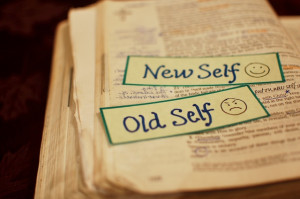The more I study the Bible, the more I hear about death.
I understand that Jesus’ death on the cross paid the price for my sins. I have come to understand that in His perfect plan, God has always required atoning death (in the Old Testament it was forshadowed in the Abraham/Isaac experience and solidified in the OT Tabernacle). Every once and a while I think to myself, why all this death? Why would a loving God require death? Couldn’t He, in His sovereignty, have chosen a less violent way to have relationship with us?
This question has plagued me for a while. During the time between the question and the answer, I have been just trying to accept it as God’s plan and remind myself His ways are not my ways. I don’t like all the death, but there are a lot of things that I don’t like. I accept them because God said so. After all, faith is about believing even when you don’t totally understand. In fact, I said in a recent blog that I don’t want to worship a God I can completely understand, and so there will be times I have to just accept stuff by faith.
 It has been my experience, though, that when I put my head down and obey without fully understanding, sometimes God will give me a glimpse of what He’s doing as a little reward. That happened today. I was studying that beloved OT Tabernacle, and the author of the study was drawing the death parallel again. The one that shows God’s plan for atonement/relationship has always been death. Substitutionary death, in most cases, like the sacrifices in the temple and the Sacrifice on the Cross (some notable exceptions being Nadab, Abihu and Uzzah), but death all the same.
It has been my experience, though, that when I put my head down and obey without fully understanding, sometimes God will give me a glimpse of what He’s doing as a little reward. That happened today. I was studying that beloved OT Tabernacle, and the author of the study was drawing the death parallel again. The one that shows God’s plan for atonement/relationship has always been death. Substitutionary death, in most cases, like the sacrifices in the temple and the Sacrifice on the Cross (some notable exceptions being Nadab, Abihu and Uzzah), but death all the same.
So I got to this death thing again tonight, and I really started understanding it differently, by God’s grace.
First, I think we have to get over the negative connotation of death. Let’s think instead of death in the greater sense. It’s a leaving of one place and going to another, right? Relinquishing one thing to move on and embrace a new thing. I mean, if you are reading this, you probably believe in at least SOME kind of afterlife. So in a way, death is letting go of one place and moving to another. Personally, I am embracing the idea of leaving this world in favor of His kingdom. I love my family, sad to leave them of course, but what’s on the other side of death is so much greater than this world can ever even fathom. Of course I am looking forward to that.
Leaving one thing and moving to another, better, thing.
Some of us are more comfortable talking about ‘dying to self’ or the ‘death of self’ as part of our once and ongoing salvation experience in THIS life. When we accept Jesus we recognize that we can’t save ourselves. So we let go, just a little bit at a time, of this world around us and all that is in it. Also, we let go of the internal voice that says ‘self,’ whether it’s self confident or self effacing. When we have our salvation experience, we begin a long process of letting go of self. In this life, I have to lean on the death of Jesus to accomplish that. But in my true death, I will be glorified by that choice in Christ and can finally rid myself of this world entirely. In both cases, death is a GIFT that God gives us to let go of this imperfect, messed up world and experience Him more fully.
Leaving one thing and moving to another, better, thing.
In the OT atonement experience, believers would place the animal on the altar as a symbol that they understood the sin they had committed and understood the wages for sin…death. The OT believer laid an innocent, perfect animal on the altar and killed it himself. What a graphic way to remind us of our separation from a holy God. This act is a gift from our loving God who gives us a way to be in relationship with Him.
Leaving the place without Him (the condition of sin) and moving to the place with Him (the reconciliation through death).
Deuteronomy 30 is a love story about this choice to leave sin and move toward our Savior God. But verse 19 sums it up:
I call heaven and earth to witness against you today, that I have set before you life and death, blessing and curse. Therefore choose life, that you and your offspring may live.
We choose life in Him when we choose death to this world, our flesh and the Enemy. When we put those things to death in us, we can truly have life. Jesus reiterates this love story from Deuteronomy when He says ‘the thief comes only to steal kill and destroy. I came that they may have life and have it abundantly.’ (John 10:10)
But we have to choose life. We do this by choosing/accepting the death of Christ on the cross as propitiation (a fancy word for substitution) for our life. Embracing this death we embrace separation from this world and the anticipation of something better.
Death, again, as leaving one place, and moving to another, better place.
 By choosing to agree with Gods requirement for death I finally acknowledge that I want all this flesh and world stuff in me to die. Of course I do. Because then I am truly at one with Him. There is no other way to be in relationship with a perfect and holy God than for the imperfect and unholy in me to die off. Figuratively for a while, as I keep padding along on earth. Then literally when I let this life go and move on to live with Him in heaven forever.
By choosing to agree with Gods requirement for death I finally acknowledge that I want all this flesh and world stuff in me to die. Of course I do. Because then I am truly at one with Him. There is no other way to be in relationship with a perfect and holy God than for the imperfect and unholy in me to die off. Figuratively for a while, as I keep padding along on earth. Then literally when I let this life go and move on to live with Him in heaven forever.
In both cases I am only able to do so through the death of my Jesus. In both cases I am finally at peace when I welcome it.



Leave a Reply